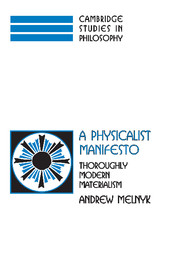Book contents
- Frontmatter
- Contents
- Preface
- Introduction
- 1 Realization Physicalism
- 2 But Why Not Supervenience?
- 3 Realizationism and R*d*ct**n*sm
- 4 Causation and Explanation in a Realizationist World
- 5 The Evidence against Realization Physicalism
- 6 The Evidence for Realization Physicalism
- References
- Index
- Titles in the series
5 - The Evidence against Realization Physicalism
Published online by Cambridge University Press: 02 September 2009
- Frontmatter
- Contents
- Preface
- Introduction
- 1 Realization Physicalism
- 2 But Why Not Supervenience?
- 3 Realizationism and R*d*ct**n*sm
- 4 Causation and Explanation in a Realizationist World
- 5 The Evidence against Realization Physicalism
- 6 The Evidence for Realization Physicalism
- References
- Index
- Titles in the series
Summary
INTRODUCTION
According to realization physicalism, every causal or contingent token – past, present, or future – that falls within the scope of (R) is either a token of a physical type or else a physically realized token of a functional type; so realization physicalism is false if there is even one causal or contingent token – past, present, or future – that falls within the scope of (R) and that is neither a token of a physical type nor a physically realized token of a functional type. Let direct evidence against realizationism be any evidence that there exists precisely such a token – any evidence that (a) there exists a causal or contingent token of some type, T, such that T is neither (b) a physical type nor (c) a functional type all of whose tokens are in fact physically realized. And let indirect evidence against realization physicalism be any evidence against it that is not direct.
Whether there exists any direct evidence against realizationism is an entirely a posteriori matter. For it is obviously a posteriori whether there actually exists a causal or contingent token of some type, T. Moreover, as argued in chapter 1, it is also a posteriori whether T is (i.e., is identical with) some physical or functional type; in particular, this issue cannot be settled by appeal to (e.g.) thought experiments intended to validate some claim of conceivability and thereby of metaphysical possibility.
- Type
- Chapter
- Information
- A Physicalist ManifestoThoroughly Modern Materialism, pp. 175 - 237Publisher: Cambridge University PressPrint publication year: 2003



